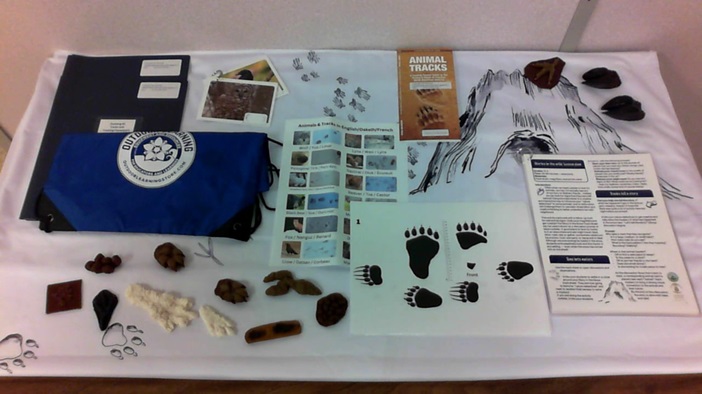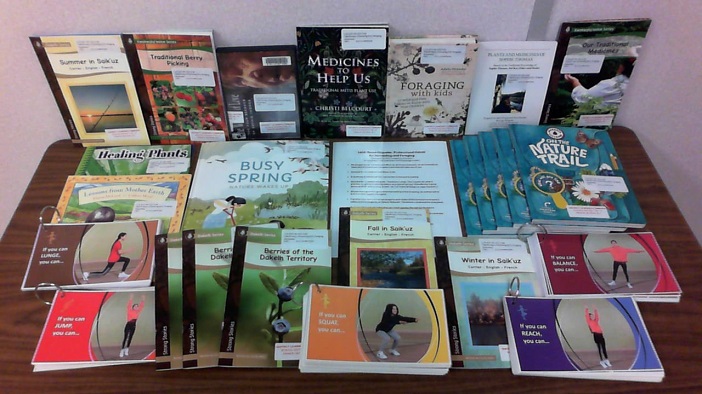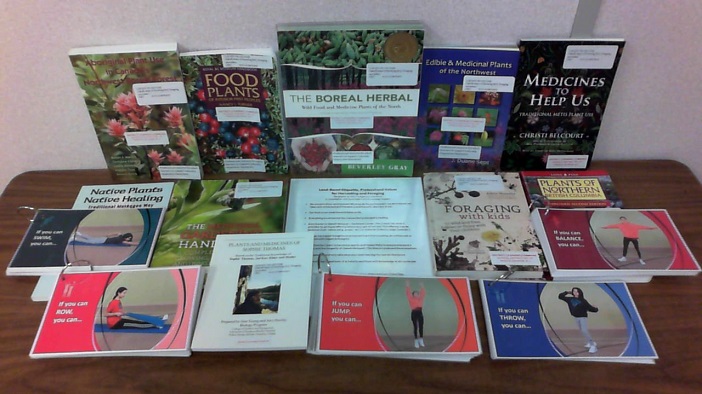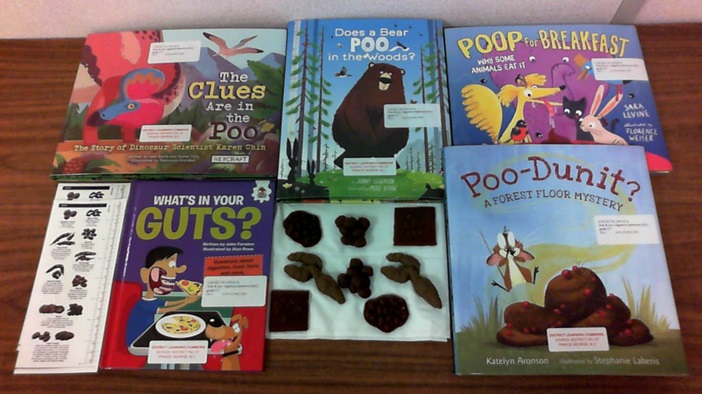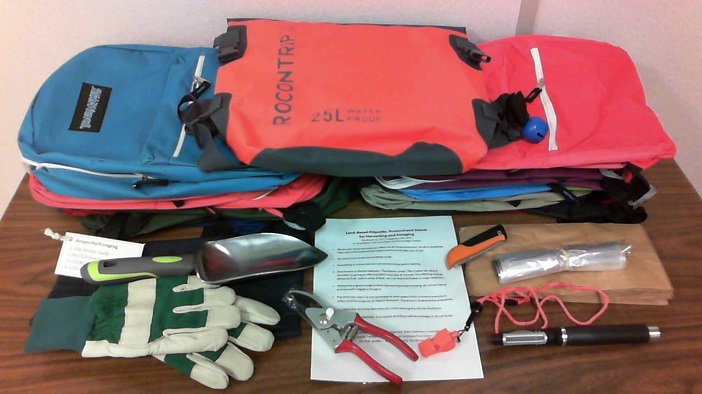Animal Tracks and Traces, Grade K-7
Learn about animals and the tracks and traces they leave behind with this kit. Featuring replicas of tracks and scat, field guides, a poster of local animals in Dakelh, English and French and digital lessons available.
Suitability: Grade K, 1, 2, 3, 4, 5, 6, 7
Subjects: Science, Social Studies.
1 Animal tracks & signs ground sheet (90 x 60 inches), 2 duotangs (#1 Tracks activity, #2 Tracks and tracking powerpoint), 1 envelope (Posters for tracks activity), 1 Animals tracks & signs lesson plan on ring (5 laminated sheets), 8 Animal tracks & signs information cards laminated on ring, 1 Animal tracks pamphlet, 1 Animal & tracks in English/Dakelh/French sheet, 13 silicone track and sign replicas (Coyote track (2), Mule deer tracks (2), Red squirrel track, Snowshoe hare track (2), Barred owl track, Crow track, Coyote scat, Mule deer scat, Squirrel scat, Mouse scat), 1 outdoor learning backpack.
Dakelh Ways of Knowing: Foraging, Elementary
This kit is rooted in the Dakelh Holistic Lifelong Learning Model. It was designed to support the collaboration of teachers, students, Indigenous Education Worker and community to go out on the land and experience traditional Lheidli harvesting and foraging practices. It was not designed for a teacher to do without the assistance of an IEW or other knowledge keeper, unless that teacher is themselves a knowledge keeper of these traditional practices. There is an additional field trip kit with supplies to take out on the land with your class. PLEASE CALL THE DLC TO BOOK THE KIT TO ARRIVE ON THE LAST WEEK OF BORROWING THE FORAGING KIT.
Suitability: Grade K, 1, 2, 3, 4, 5, 6, 7
Subjects: Science, Social Studies, Indigenous Studies, Physical Education, Core Competencies.
19 books (some multiple copies of the same title), 1 "The Warmth of Love : the four seasons of Sophie Thomas" DVD, 5 sets ISPARC Physical Literacy cards (45 cards/set), 1 "Land-based etiquette, protocol and values for harvesting and foraging" sheet.
-
Backpack Explorer: on the Nature Trail by Gold Mom's Choice Award Winner Jump-start curiosity with this take-along field guide for children ages 4 to 8. From worms, birds, and spiders to trees, flowers, and clouds, young explorers learn what to look and listen for wherever they are -- whether in a nature preserve, an urban park, or a suburban backyard. Seek-and-find lists, on-the-trail art projects, and discovery games get kids engaged in hands-on learning about nature, and a real pull-out magnifying glass helps them get a close-up glimpse of leaf veins, seed pods, and tiny insects. Filled with activities, checklists, and stickers, this interactive nature guide belongs in every kid's backpack. Now nature-curious kids can play and learn with the companion Backpack Explorer online game!
ISBN: 9781635861976Publication Date: 2018-11-27 -
Berries of the Dakelh Territory by Wild berries grow almost everywhere. Some wild berries are good to eat while others will make you sick. It is important to know if a berry is safe to eat before you pop it into your mouth! What kinds of berries have you eaten?
ISBN: 9781771743235Publication Date: 2018-09-27 -
Busy Spring: Nature Wakes Up by In this uplifting picture book about spring, follow two children and their father through their backyard as they discover all the different ways nature wakes up from its long winter sleep. Spot the busy creatures and plants as the tale unfolds, then learn about how each responds to the increasing daylight and warmth that usher in the season. Co-authors Sean Taylor (picture book author) and Alex Morss (ecologist, journalist, and educator) offer an inviting introduction to the science behind spring. The yard is bright, birds are singing, the bees are buzzing, and there are tadpoles in the pond! What is all the commotion about? In each colorful scene, the family discovers a different sign of spring—a bird collecting twigs for its nest, a fox snuggling her cubs, a caterpillar feasting on leaves… After the story, annotated illustrations explain the spring behaviors of various plants and animals. Inspire an appreciation for the natural world in this joyous exploration of spring.
ISBN: 9780711255395Publication Date: 2021-03-16 -
Fall in Saik'uz = Saik'uz Dak'et Suli = L'automne à Saik'uz by In Dakelh (Nak'azdli), English, and French. Come north to Saik’uz (sigh-kuz) located within the Dakelh Territory and see the leaves turn colour in fall! What is something that you love about fall? (Written in CarrIer, English and French)
ISBN: 9781771743266Publication Date: 2018-09-27 -
Foraging with Kids by A fun, informative and practical introduction to safely foraging with kids, from the UK's bestselling foraging author. In today's world of increasingly sedentary lifestyles and a growing detachment from the food that we eat, it has never been more important to encourage children to put down their screens, get outside and engage with the natural world around them.Foraging with Kidsis a fun, practical book for parents to work through with their children that encourages families to interact with their environment and gain knowledge and practical understanding of the natural world through exploration and play. The projects are based around 50 easy-to-identify plants that are abundant in parks, forests and hedgerows worldwide, making the challenge of discovering functional flora just as achievable to those who live in the city as in the countryside. Once they have foraged their plants, children will be amazed by the diverse practical uses that they can set them to; from making soap from conkers or setting a delicious egg-free custard with plantain, to stopping minor cuts from bleeding with hedge woundwort. Children will take great pride in seeing their gatherings forming part of the family meal and parents will be amazed at how even the most vegetable-averse child will develop an enthusiastic appetite for a meal that they have contributed to. Illustrated throughout with beautiful hand drawings and with essential information on plant facts and identification, as well as a diverse range of engaging, practical projects that the whole family will want to get involved with, this is the perfect book for anyone who wants the children under their care to get outside, connect with nature and have a lot of fun in the process.
ISBN: 9781786781635Publication Date: 2018-09-18 -
Healing Plants by Healing Plants helps young readers find the answers to questions and learn about the incredible health benefits of plants, from aloe vera to quinine. Call-outs throughout the book prompt inquiry and critical thinking skills by asking questions and inviting readers to looks closely at the photographs and diagrams.
ISBN: 9781631880377Publication Date: 2014-08-01 -
Lessons from Mother Earth by Tess has visited her grandmother many times without really being aware of the garden. But today they step outside the door and Tess learns that all of nature can be a garden. And if you take care of the plants that are growing, if you learn about them -- understanding when they flower, when they give fruit, and when to leave them alone -- you will always find something to nourish you. This gentle story demonstrates the First Nations' tradition of taking care of Mother Earth.
ISBN: 9780888998323Publication Date: 2010-04-01 -
Medicines to Help Us: Traditional Métis Plant Use by Based on Métis artist Christi Belcourt’s painting “Medicines to Help Us,” this innovative and vibrant resource honours the centuries-old healing traditions of Métis women. For this stunning set of twenty-seven gallery-quality prints and accompanying companion booklet, Christi Belcourt fuses her evocative artwork with Indigenous Traditional Knowledge and Western Science. With contributions from Métis Elders Rose Richardson and Olive Whitford, as well as key Michif phrases and terminology, Medicines to Help Us is the most accessible resource relating to Métis healing traditions produced to date.
ISBN: 9780920915790Publication Date: 2007-01-01 -
Our Traditional Medicines by Kwakwaka’wakw (kwok-wok-ya-wokw) people believe that our human spirit must be taken care of. We have medicines for taking care of our body, mind, emotions, and spirit. What do you do to take care of yourself?
ISBN: 9781771743099Publication Date: 2018-09-27 -
 Plants and Medicines of Sophie Thomas
by
Based on the Traditional Knowledge of
Sophie Thomas, Sai'kuz Elder and Healer. The information contained in this book is only a small part of the knowledge used by Sophie Thomas as a Healer. This book is not a guide to the preparation or prescription of medicines, ... the book is a compilation of traditional Aboriginal information and scientific description of some of the medicinal plants and medicines collected and prepared by Sophie Thomas. Plant Descriptions - A general description of the plant, information on the leaves, flowers,and fruits and a description of the habitat in which the plant lives are provided in the section on botanical description. The section on traditional knowledge includes identification of the part of the plant used for medicine, the time of year the plant is collected for medicine, how the medicine is prepared, and what conditions or ailments are treated with that medicine, as conveyed by Sophie. Photographs are included as an aid to identification of each plant and the part of the plant that is used for medicinal purposes. A summary table of Sophie's medicines and their uses, a glossary of terms, and further readings, are provided for easy reference near the end of the book.
Publication Date: 2002-01-01
Plants and Medicines of Sophie Thomas
by
Based on the Traditional Knowledge of
Sophie Thomas, Sai'kuz Elder and Healer. The information contained in this book is only a small part of the knowledge used by Sophie Thomas as a Healer. This book is not a guide to the preparation or prescription of medicines, ... the book is a compilation of traditional Aboriginal information and scientific description of some of the medicinal plants and medicines collected and prepared by Sophie Thomas. Plant Descriptions - A general description of the plant, information on the leaves, flowers,and fruits and a description of the habitat in which the plant lives are provided in the section on botanical description. The section on traditional knowledge includes identification of the part of the plant used for medicine, the time of year the plant is collected for medicine, how the medicine is prepared, and what conditions or ailments are treated with that medicine, as conveyed by Sophie. Photographs are included as an aid to identification of each plant and the part of the plant that is used for medicinal purposes. A summary table of Sophie's medicines and their uses, a glossary of terms, and further readings, are provided for easy reference near the end of the book.
Publication Date: 2002-01-01 -
Summer in Saik'uz = Saik'uz Shen Suli = L'été à Saik'uz by In Dakelh (Nak'azdli), English, and French. Come north to Saik’uz (sigh-kuz) located within the Dakelh Territory and see the berries and animals! What is something that you love about summer? (Written in CarrIer, English and French)
ISBN: 9781771743280Publication Date: 2018-09-27 -
Traditional Berry Picking by Kwakwaka’wakw (kwok-wok-ya-wokw) people harvest many types of berries. We are careful to take care of our berries in the forest. What do you take care of in the forest?
ISBN: 9781771743136Publication Date: 2018-09-27 -
Winter in Saik'uz = Saik'uz Khui Suli = L'hiver à Saik'uz by In Dakelh (Nak'azdli), English, and French. Come north to Saik’uz (sigh-kuz) located within the DakelhTerritory and see what happens on cold winter days! What is something that you love about winter? (Written in CarrIer, English and French)
ISBN: 9781771743297Publication Date: 2018-09-27
Dakelh Ways of Knowing: Foraging, Secondary
This kit is rooted in the Dakelh Holistic Lifelong Learning Model. It was designed to support the collaboration of teachers, students, Indigenous Education Worker and community to go out on the land and experience traditional Lheidli harvesting and foraging practices. It was not designed for a teacher to do without the assistance of an IEW or other knowledge keeper, unless that teacher is themselves a knowledge keeper of these traditional practices. There is an additional field trip kit with supplies to take out on the land with your class. PLEASE CALL THE DLC TO BOOK THE KIT TO ARRIVE ON THE LAST WEEK OF BORROWING THE FORAGING KIT.
Suitability: Grade 8, 9, 10, 11, 12
Subjects: Science, Social Studies, Indigenous Studies, Physical Education, Core Competencies.
10 books, 5 sets ISPARC Physical Literacy cards (45 cards/set), 1 "Land-based etiquette, protocol and values for harvesting and foraging" sheet.
-
Aboriginal Plant Use in Canada's Northwest Boreal Forest by This handbook describes the traditional uses by aboriginal people ofmore than 200 different plants from Canada's boreal forest. It isthe result of original ethnobotanical fieldwork in 29 communitiesacross the boreal forest region of Manitoba, Saskatchewan, and Alberta.Natural resources of the boreal forest have always been essential tothe dietary, medical, economic, and spiritual well-being of FirstNations people, but until now much of their traditional environmentalknowledge has remained unrecorded and at risk of being lost. To compile this book the authors, along with seven other FirstNation trainees, five Métis trainees, and four other botany students,learned how to collect voucher plant specimens and record traditionalknowledge about the use of plants for medicine, handicrafts,technology, and ritual practices. Over 100 elders contributedinformation that they felt should be shared among communities. The entries and accompanying photographs are arranged according tothe plant family and include information on physical descriptions,habitat, uses for food, technology, medicine, and potential economicuse. The book also includes an explanation of the research approach, aliterature review, and an overview of the ecological and culturalbackground of the area.
ISBN: 9780660198699Publication Date: 2000-05-01 -
The Boreal Herbal by The Boreal Herbal: Wild Food and Medicine Plants of the North is an indispensable guide to identifying and using northern North American (and in many cases European and Asian) plants for food and medicine. Whether you're hiking in remote areas or gardening in your backyard, this easy-to-use handbook will help you recognize and use fifty-five common wild plants that have extraordinary healing properties. With The Boreal Herbal by your side you will learn how to soothe aches and pains with willow, staunch a bleeding wound with yarrow, treat a urinary-tract infection using bearberry, and create a delicate and moisturizing wild-rose skin cream. Author Beverley Gray has also included dozens of healthy and delicious recipes, including Wild-Weed Spanakopita, Dandelion Wine, and Cranberry-Mint Muffins. The Boreal Herbal features: Profiles of 55 herbs, berries and trees found in the northern boreal forest including data on habitat, harvest times, medicinal applications, food uses, cosmetic uses, and spiritual uses Full-colour photographs and botanical illustrations of each plant profiled in the book (and similar-looking plants) for easy identification Instruction on how to gather and preserve wild plants More than 200 recipes: teas, tinctures, powders, flower essences, topical treatments like salves and creams, beverages, jams and jellies, baked goods, soups, entrées, and more Safety tips for harvesting and using edible and medicinal wild plants, including information on calculating dosage and plant-specific cautions A resource section for people interested in starting up a non-timber forest-products business Botanical and medicinal glossaries, an index, and handy reference charts listing the plants' medicinal actions and vitamin contents Beverley Gray is a boreal herbalist, aromatherapist, natural-health practitioner, journalist, and an award-winning natural health-product formulator. She owns the Aroma Borealis Herb Shop in Whitehorse, Yukon.
ISBN: 9780986827105Publication Date: 2011-01-01 -
Edible & Medicinal Plants of the Northwest: Alaska, Western Canada & the Northwestern United States by The edible and medicinal wild plants of the Northwest have a long history of traditional use, with some remarkable success stories. Hundreds or perhaps thousands of years’ experience with the nourishing and healing properties of indigenous plants have been passed down through generations of Native peoples. Today, some deadly diseases such as breast and ovarian cancers are treated with extracts from native plants. Many roots, flowers, leaves and stems can be eaten raw or cooked, and some plants can even be made into beer. A surprising number of common local plants make tasty, nutritious treats or relieve health troubles. Meet 66 of them in this amazing new book! Chapters include information on trees, shrubs, wildfl owers, aquatic plants, horsetails, ferns and poisonous plants with lists of herapeutic plant uses and a medicinal glossary.
ISBN: 9780973981988Publication Date: 2014-06-15 -
Food Plants of Interior First Peoples by Nancy Turner describes more than 150 plants traditionally harvested and eaten by First Peoples east of the Coast Mountains in British Columbia and northern Washington. Each description includes information on where to find the plant and a discussion on traditional methods of harvesting and preparation.
ISBN: 9780772658463Publication Date: 2007-11-22 -
Foraging with Kids by A fun, informative and practical introduction to safely foraging with kids, from the UK's bestselling foraging author. In today's world of increasingly sedentary lifestyles and a growing detachment from the food that we eat, it has never been more important to encourage children to put down their screens, get outside and engage with the natural world around them.Foraging with Kidsis a fun, practical book for parents to work through with their children that encourages families to interact with their environment and gain knowledge and practical understanding of the natural world through exploration and play. The projects are based around 50 easy-to-identify plants that are abundant in parks, forests and hedgerows worldwide, making the challenge of discovering functional flora just as achievable to those who live in the city as in the countryside. Once they have foraged their plants, children will be amazed by the diverse practical uses that they can set them to; from making soap from conkers or setting a delicious egg-free custard with plantain, to stopping minor cuts from bleeding with hedge woundwort. Children will take great pride in seeing their gatherings forming part of the family meal and parents will be amazed at how even the most vegetable-averse child will develop an enthusiastic appetite for a meal that they have contributed to. Illustrated throughout with beautiful hand drawings and with essential information on plant facts and identification, as well as a diverse range of engaging, practical projects that the whole family will want to get involved with, this is the perfect book for anyone who wants the children under their care to get outside, connect with nature and have a lot of fun in the process.
ISBN: 9781786781635Publication Date: 2018-09-18 -
The Medicinal Gardening Handbook by Dig into the world of herbal medicine with this complete guide to cultivating and harvesting plants with healing properties. For thousands of years people have been utilizing herbs and cultivating weeds found to speed the healing of wounds, soothe skin irritations, calm uneasy stomachs, and ward off illnesses. Now you can plan and grow your own garden first aid kit. In these pages, you'll learn the basics of gardening in your backyard--or on your windowsill or porch--including instructions for preparing soil, composting, and weeding. You'll then find detailed descriptions of the twelve most common, easy-to-grow, most useful healing herbs, with instructions for growing, harvesting, and utilizing them. These powerful plants include: * Garlic, which boosts immunity, reduces blood pressure, and combats cancer * Echinacea, which reduces inflammation, boosts immunity, and has antiviral properties * Yarrow, which accelerates the healing of wounds, is an anti-inflammatory, and can relieve PMS symptoms * Elderflower, which is an astringent and can relieve arthritis and soothe sore throats * Mint, which soothes digestive problems, sweetens breath, and can reduce fevers * Elecampane, a respiratory tonic with antibacterial and antifungal properties * And more!
ISBN: 9781629141954Publication Date: 2014-05-20 -
Medicines to Help Us: Traditional Métis Plant Use by Based on Métis artist Christi Belcourt’s painting “Medicines to Help Us,” this innovative and vibrant resource honours the centuries-old healing traditions of Métis women. For this stunning set of twenty-seven gallery-quality prints and accompanying companion booklet, Christi Belcourt fuses her evocative artwork with Indigenous Traditional Knowledge and Western Science. With contributions from Métis Elders Rose Richardson and Olive Whitford, as well as key Michif phrases and terminology, Medicines to Help Us is the most accessible resource relating to Métis healing traditions produced to date.
ISBN: 9780920915790Publication Date: 2007-01-01 -
Native Plants, Native Healing by Tis Mal Crow studied the medicinal use of plants and traditional native root doctoring techniques from childhood. He shared his knowledge and insights on how to gather herbs respectfully and use them to make tinctures, teas, liniments, oils, lotions and salves for medicinal use. Twenty-two Eastern Woodland plants are profiled and identified by their doctrine of signature, which ailments respond to their treatment, and what type of application works best. The importance of responsible harvesting is stressed, as a number of wild medicinal plants face extinction due to overharvesting.
ISBN: 9781570671050Publication Date: 2001-01-05 -
 Plants and Medicines of Sophie Thomas
by
Based on the Traditional Knowledge of
Sophie Thomas, Sai'kuz Elder and Healer. The information contained in this book is only a small part of the knowledge used by Sophie Thomas as a Healer. This book is not a guide to the preparation or prescription of medicines, ... the book is a compilation of traditional Aboriginal information and scientific description of some of the medicinal plants and medicines collected and prepared by Sophie Thomas. Plant Descriptions - A general description of the plant, information on the leaves, flowers,and fruits and a description of the habitat in which the plant lives are provided in the section on botanical description. The section on traditional knowledge includes identification of the part of the plant used for medicine, the time of year the plant is collected for medicine, how the medicine is prepared, and what conditions or ailments are treated with that medicine, as conveyed by Sophie. Photographs are included as an aid to identification of each plant and the part of the plant that is used for medicinal purposes. A summary table of Sophie's medicines and their uses, a glossary of terms, and further readings, are provided for easy reference near the end of the book.
Publication Date: 2002-01-01
Plants and Medicines of Sophie Thomas
by
Based on the Traditional Knowledge of
Sophie Thomas, Sai'kuz Elder and Healer. The information contained in this book is only a small part of the knowledge used by Sophie Thomas as a Healer. This book is not a guide to the preparation or prescription of medicines, ... the book is a compilation of traditional Aboriginal information and scientific description of some of the medicinal plants and medicines collected and prepared by Sophie Thomas. Plant Descriptions - A general description of the plant, information on the leaves, flowers,and fruits and a description of the habitat in which the plant lives are provided in the section on botanical description. The section on traditional knowledge includes identification of the part of the plant used for medicine, the time of year the plant is collected for medicine, how the medicine is prepared, and what conditions or ailments are treated with that medicine, as conveyed by Sophie. Photographs are included as an aid to identification of each plant and the part of the plant that is used for medicinal purposes. A summary table of Sophie's medicines and their uses, a glossary of terms, and further readings, are provided for easy reference near the end of the book.
Publication Date: 2002-01-01 -
Plants of Northern British Columbia by More than 500 species of trees, shrubs, wildflowers, grasses, ferns, mosses and lichens are illustrated and described. Revised and substantially updated, this comprehensive and accessible guide to a region rich in plant life includes new photographs and native uses of plants.
ISBN: 9781774510971Publication Date: 2021-09-01
Scat & Poo: Digestion Detectives: Grade 3-7
Biology can be disgusting but it can also give us clues. Become a digestion detective and learn more about your digestive system and animals in this cross-curricular kit. Designed to take science outdoors and start thinking about our natural world. Features replica scat from a variety of animals.
Suitability: Grade 3, 4, 5, 6, 7
Subjects: Science, Outdoor Education.
5 books, 8 silicone animal scat replicas (Coyote scat (2), Mouse scat (2), Mule deer scat (2), Squirrel scat), 2 Scat identification cards.
-
The Clue Is in the Poo: the Story of Dinosaur Scientist Karen Chin by Karen Chin is hunting for treasure. But she's not interested in gold or jewels...she's interested in poo. Fossilized dinosaur poo, specifically. What can she learn from this prehistoric feces? Follow the clues and see where Karen's curiousity takes her as she searches for answers about how dinosaurs lived and what the world looked like long ago.
ISBN: 9781478876175Publication Date: 2023-07-20 -
Does a Bear Poo in the Woods? by A young bear looks for a place to poo in this hilarious and cheeky rhyming picture book that makes the perfect toilet-training primer. When a shy bear feels the urge to go, there's only one thing on his mind: finding a private place where he can poo in peace! But a whole host of woodland animals who have no problem about pooing wherever they please just won't leave him alone. Where can the little bear go?
ISBN: 9781665903479Publication Date: 2023-06-13 -
Poo-Dunit? by This rollicking, rhyming tale of animal poo will have children squealing with laughter--even as they learn about forest ecosystems and discover surprising facts about scat. Sniff, sniff! went Mouse. Whiff, whiff! went Mouse. "Who left this poo outside my house? I must undo this mystery. Poo-dunit?" Mouse is dismayed to step outside her house one morning only to discover a giant pile of poo! Who could have done such a dastardly deed? Mouse questions all the animals of the forest, but it's too big to be Squirrel's, too dark to be Coyote's, and too messy to be Deer's. Will Mouse ever track down the culprit--and will she find a way to make the best of this smelly situation? Between giggles at every mention of the word poo, children will learn to identify eight different animals' scat and discover how droppings can help plants to grow, all while enjoying Katelyn Aronson's rhyming text and Stephanie Laberis's expressive animals. Back matter includes a mini "poo-dunit" mystery challenging children to match scat with the correct animal, as well as a note on why poo is precious--and who is responsible for the biggest poo of all.
ISBN: 9781536216370Publication Date: 2022-06-07 -
Poop for Breakfast by Eating poop is gross! So why do some animals do it? For lots of good reasons!Male butterflies slurp up poop to give as a gift to females, which makes their eggs stronger. Robins scarf down the poop of young chicks because it's full of undigested nutrients. And baby elephants gobble up the poop from adults to get essential bacteria into their digestive systems. This disgustingly informative book is bursting with lots of surprising information about animals--and digestion!
ISBN: 9781728457963Publication Date: 2023-04-04 -
What's in Your Guts? by What's in Your Guts? is a fantastic introduction to the science behind the human digestive system for young kids. Hilarious, colorful illustrations and an engaging question-and-answer format makes this key subject fun and accessible for even the most reluctant readers. It's also packed with plenty of giggle-worthy gross bits that kids love to read about! Stuff kids want to know, that need an answer... how does your body turn food into poop? why do farts smell bad? why do we need to pee, it's sometimes very inconvenient! what's so good about our liver? Find the answers to these questions and much more! With so many fun facts to uncover, science has never been more fun!
ISBN: 9781915461056Publication Date: 2023-08-01
Dakelh Ways of Knowing: Foraging Field Trip Equipment
This equipment kit accompanies the Dakelh ways of knowing : foraging kits available at the DLC. There are two different foraging kits, focusing on elementary and secondary. The kits are rooted in the Dakelh Holistic Lifelong Learning Model. They are designed to support the collaboration of teachers, students, Indigenous Education Worker and community to go out on the land and experience traditional Lheidli harvesting and foraging practices. It was not designed for a teacher to do without the assistance of an IEW or other knowledge keeper, unless that teacher is themselves a knowledge keeper of these traditional practices.
Suitability: Grade K, 1, 2, 3, 4, 5, 6, 7
Subjects: Science, Social Studies, Indigenous Studies, Physical Education, Core Competencies.
15 student backpacks (includes Dakelh nature cards [9], 1 small clipboard), teacher backpack with attached bear bell, denim equipment bag (1 whistle, 1 garden trowel, 1 Kitchen Aid peeler, 1 Yardwords pruning sheers, 1 Fiscars produce knife, 1 pair work gloves), 15 baggies, 15 paper bags for students, 1 "Land-based etiquette, protocol and values for harvesting and foraging" sheet.
Additional Supplies Needed: School First Aid Kit, Felt pens, Paper, Drum + Drummer (IEW). NOTE: Do not return the baggies or paper bags. They will be resupplied at the DLC.
